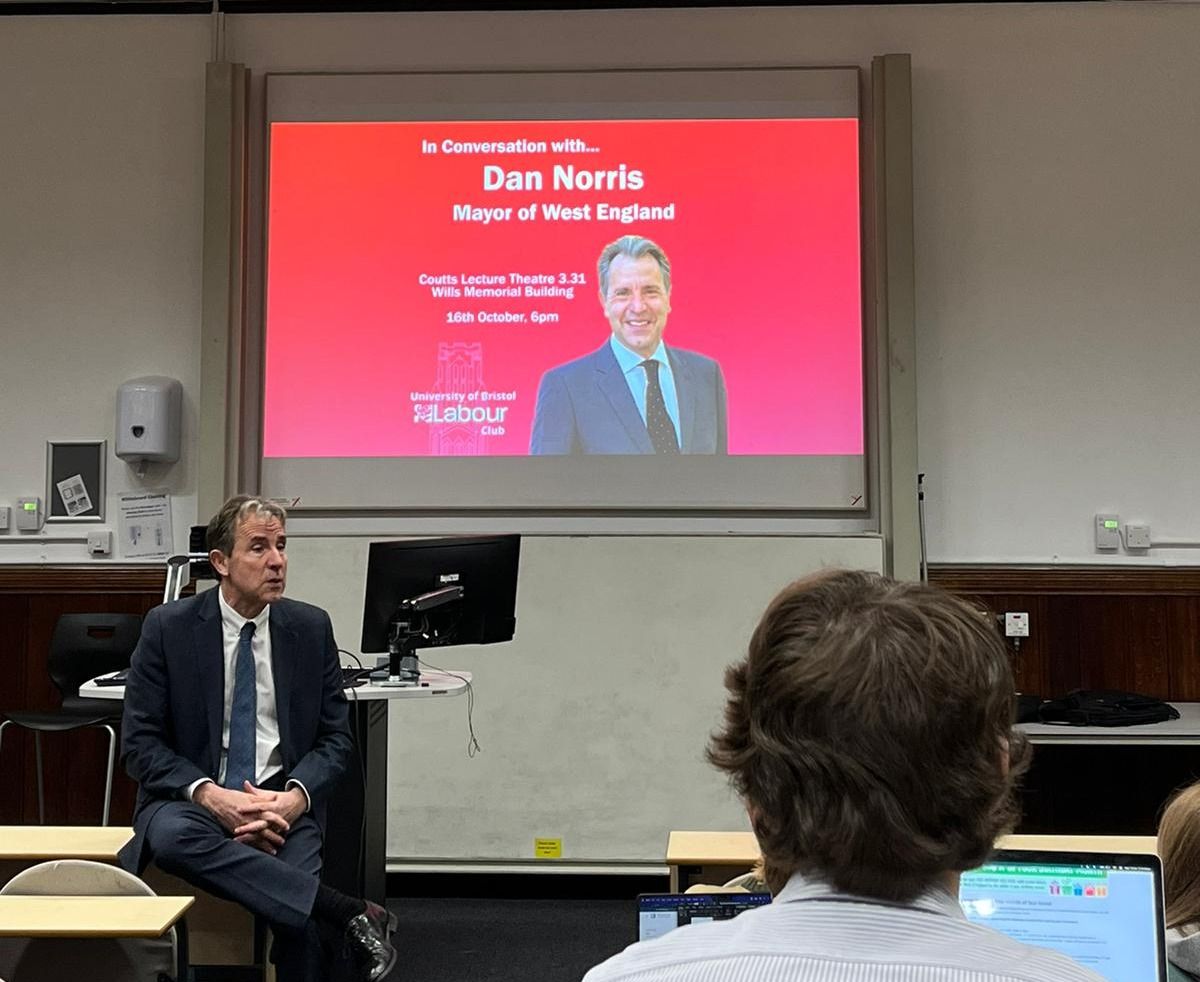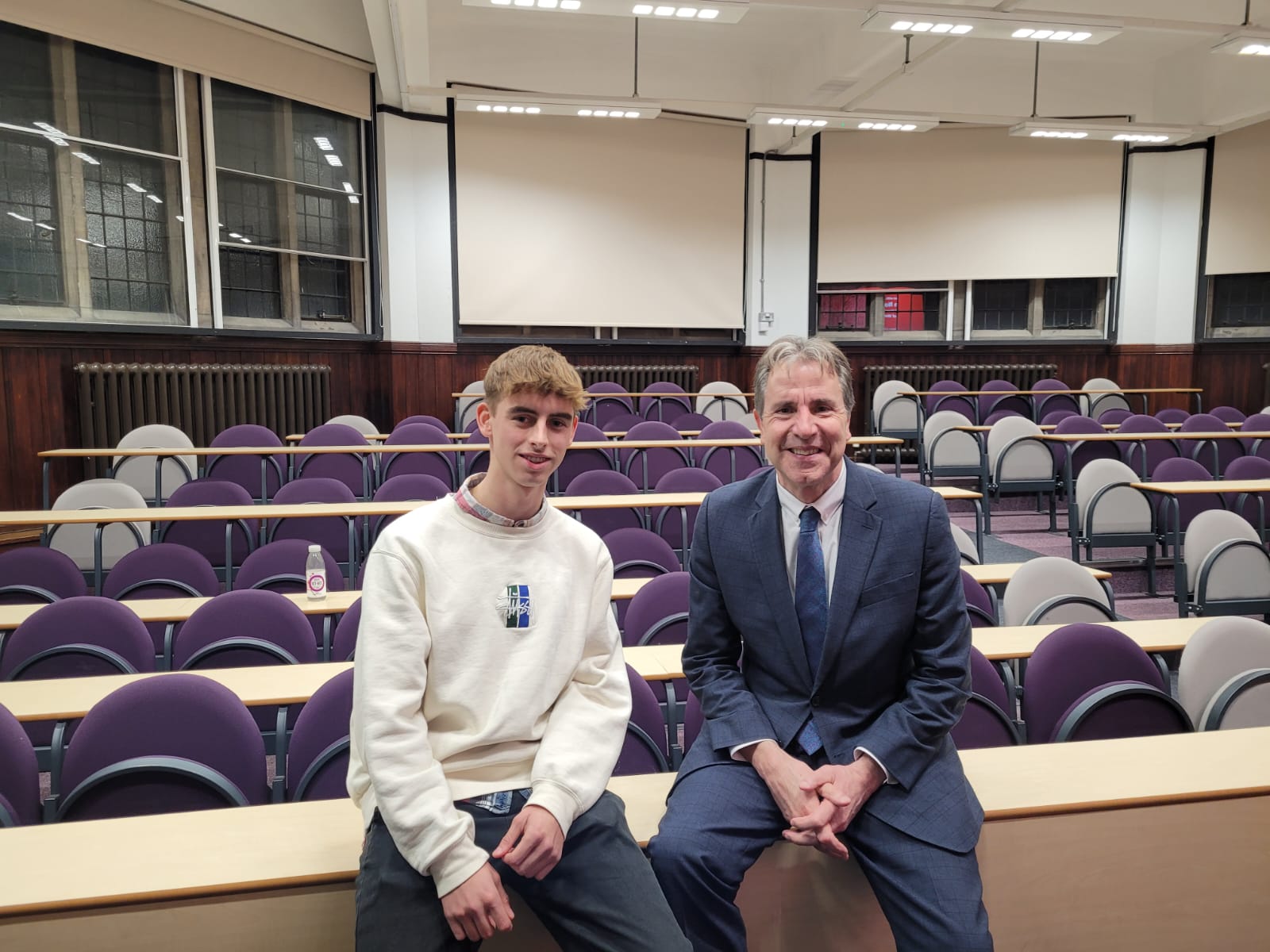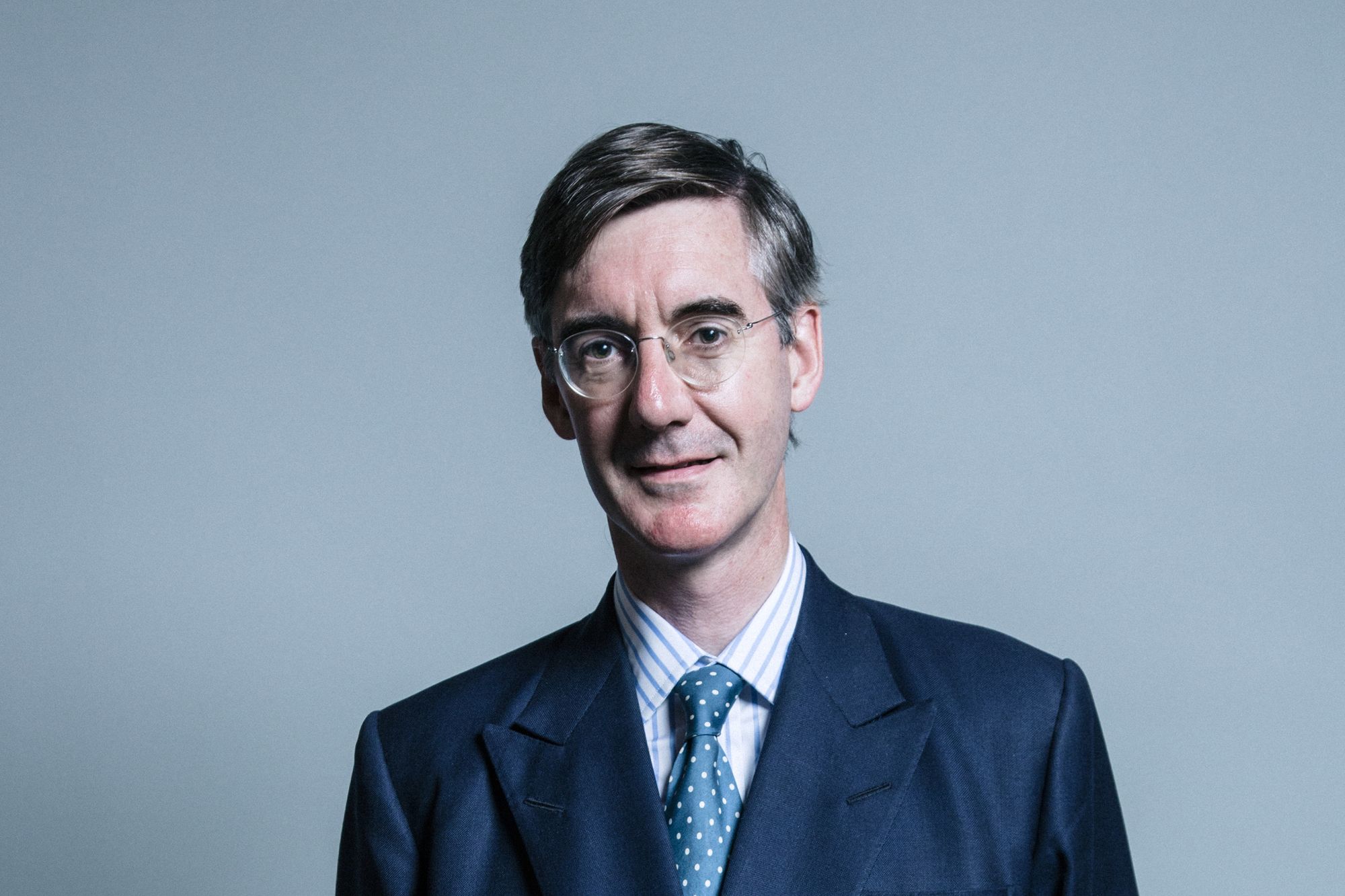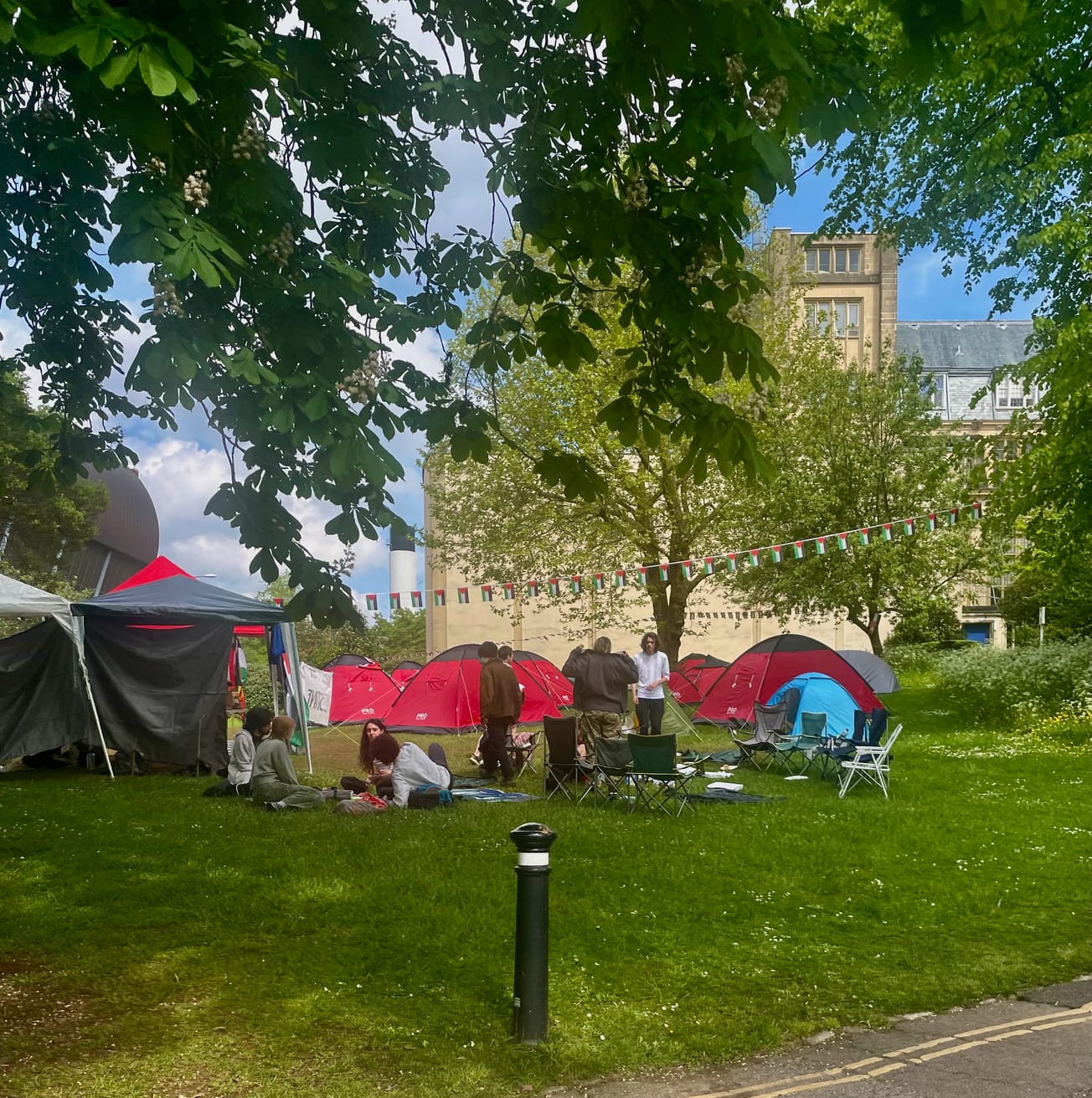By Will Standring, News Editor
‘Politics is the art of the possible’. He says it as a sidenote, but after fifteen minutes with Dan Norris it’s clear how central this Harold Wilson quote is to his politics.
Norris speaks the language of pragmatism. Everything comes back to what is within the realm of possibility. He’s not against big ideas - he subtly expresses support for state ownership of transport – but he’s far more concerned with the here and now, what can we afford, what holds public support and what can be properly implemented in an imperfect political system.
We’re perched on a desk in a Wills Memorial classroom. It could have been The Berkeley but the Mayor refused my offer of a pint on the grounds of concerns over sound quality – his loss. After an hour with the University of Bristol Labour Club (UBLC), following a call with Keir Starmer and Sue Gray, it is Epigram’s turn to quiz the Mayor.

A political career spanning four decades has landed him as the Mayor of the West of England, a role to which he was elected in 2021. This leaves him in charge of long-term strategy for transport, business and investment in Bristol, South Gloucestershire, Bath and North East Somerset. Before Mayoralty he was the Labour MP for Wansdyke (between Bath and Bristol) from 1997 to 2010. As Epigram reported last week he is strongly considering standing against Jacob Rees Mogg in his old constituency at the upcoming election.
Mayor Norris made headlines last month when a group of protestors occupied his office demanding he hold a vote over bus franchising at his next meeting. Franchising, which would place the transport network under Norris’ control but not ownership, is not an idea he opposes. He is just uncertain whether Bristol currently has the resources to implement it. He mentions the shortage of bus drivers and tries to sell me the job.
‘Be a hero, drive a bus. I would honestly say to all students, check out being a bus driver. If you don’t drive a car, they will train you to drive a car first before they train you to drive a bus. That’s quite an incentive for lots of people.’
As someone who hasn’t got around to learning to drive, I’m tempted. Norris is keen to point out that bus-driving-students can take their job home with them in the holidays… Convinced yet?
🔴NORTH EAST SOMERSET & HANHAM (Lab rank 353): Epigram reports West of England mayor Dan Norris considering applying to be Lab candidate against Jacob Rees-Mogg in this seat, where Mogg beat him in 2010. Norris was MP for old Wansdyke seat from 1997-2010. https://t.co/kvuqN2De6R
— @Tomorrow'sMPs (@tomorrowsmps) October 18, 2023
We return to the bus franchising protest but this time turn to the student activism.
‘I get the passion and sometimes the frustration and the anger. That motivates me to try and find solutions, but I know it’s not easy. People feel really passionately and strongly about things like transport, and I understand that because I remember feeling that when I was young.’
One wonders at what point along his journey from student to social worker and MP to Mayor this passion was replaced (or complemented) by his pragmatic desire for sensible solutions.
More transport. This time we discuss his opposition to plans for a Bristol Underground.
‘I have all sorts of ideas for if I had an infinite amount of money or time to do it in, but I actually have to live in the real world where you take the public with you. What I have found is that when the underground as a possibility comes up the public laugh about it. If the public feel that unengaged with it, that is not a sensible place to keep carrying on.’

Mayor of Bristol, Marvin Rees, has come out publicly in favour of an underground creating a dividing line with fellow Labour Mayor Norris. However, Norris says he will nonetheless be sad to see him go in 2024, when the Bristol Mayoralty is abolished following a 2022 referendum. ‘I do think that the decision to not have an elected mayor in Bristol is not a great decision, I think the mayor system is a good system.’
Norris says his issue with the decision lies in the lack of clarity over the structure of the incoming committee system, for which plans have not been completed. ‘I’m not sure that the committee system will please [the public] when they realise that it is not the most efficient way to get things done quickly.’
Although he acknowledges that the reduced number of mayors will help to de-mystify Bristol’s political setup, he is not sure that the committee system will provide the required clarity. ‘People need to know who to talk to, who to lobby when things are not going right, more importantly than when they are going well. When things are going wrong people need to know who can bring about the changes that they are seeking.’
Another likely change that the committee system will bring is an increased power to the Green Party, who have more councillors than Labour (25 Green, 24 Labour) but are excluded from political cabinet as this is appointed by the Labour mayor.
‘At the moment what we’ve got is Greens, in Bristol in particular, talking about all sorts of ideas, many of which I don’t disagree with, but the reality is that if you’re not in power it’s easy to say all sorts of things.’ Once again, Norris’ unrelenting focus on the possible shines through. ‘I think that the Greens are being a bit complacent. I think they assume that people will automatically go to them and I don’t think any political party can do that. What [Labour] have to show is that people can have trust in politics. There’s huge cynicism.’
We’ve got a special birthday gift for you. 🎂 🚌 Throughout your birthday month, enjoy free travel on buses across the West of England. Apply now: https://t.co/EAuM8WOH5M pic.twitter.com/9ISl9rlvlk
— West of England Combined Authority (@WestofEnglandCA) July 5, 2023
I put it to him that Keir Starmer’s movement of the Labour Party to the right of Bristol’s electorate may leave Bristol’s Labour MPs vulnerable to a Green Party challenge, particularly in the new Bristol Central seat currently held by Thangam Debbonaire. He is doubtful, however. ‘No, I don’t think so because I think people are very realistic when it comes to General Elections, it’s not like a local election. What people are looking at is not the perfect government and Labour government as a choice.’
After a brief rant on the failures of the Conservative Party, he turns to one of his favourite topics. ‘It’s been aided and abetted by the Lib Dems for the first five years of austerity, and they don’t want to talk about that now it doesn’t suit them, but they were part of that.’
It’s now clear to me why Norris’ 1998 Parliamentary Profile referred to him as a ‘specialist at Lib Dem-bashing’. Twenty-five years on and, potentially unlike other aspects of his politics, his animosity for them has not faded. ‘Their price was to be sent to the House of Lords or get knighthoods or get a CBE for services to politics … If you don’t believe me, ask Sir Ed Davey.’ A wry smile on his face, it is clear he’s proud of this line and it’s not the only time he manages to pivot an answer towards a dig at the Lib Dems.

Norris’ Labour party have a twenty-point lead in the polls over the Tories and after two convincing by-election wins look set to emerge victorious from the upcoming General Election. One might think that Norris would be excited for the enactment of left-leaning policy programme after thirteen years of Conservative rule.
However, Norris thinks differently. ‘Labour needs to get into power to get some competency in because at the moment it’s crazy.’ It’s not a progressive vision for a future Labour Britain that excites Norris, but that a Starmer premiership would be more professional and proficient. He’s clearly tired of dealing with the current government’s constant chop and changing; in his two years in post as Mayor Norris has had to deal with three different Prime Ministers. After the recent announcement that the northern leg of HS2 would be scrapped with the funds to be spent elsewhere Norris still seems unsure what he will be receiving. ‘They are really very odd.’
He is quick to contrast this with Leader of the Opposition, Keir Starmer, who he says showed ‘amazing self-control’ when they were kicked out of a pub in Bath on Norris’ 2021 campaign trail owing to Starmer’s support for covid restrictions. It is not Starmer’s self-control, nor his ‘straight-talking and honesty’, that Norris names as Starmer’s strongest strength but that he is simply ‘lucky, the most important quality’. ‘Lucky’ that the Conservative government have imploded and gifted him a huge poll lead. Although Norris thinks that the ‘jury is still out’ regarding public support for Labour, he is optimistic that Labour can put forward a positive vision for the country.
Featured Image: West of England Combined Authority








